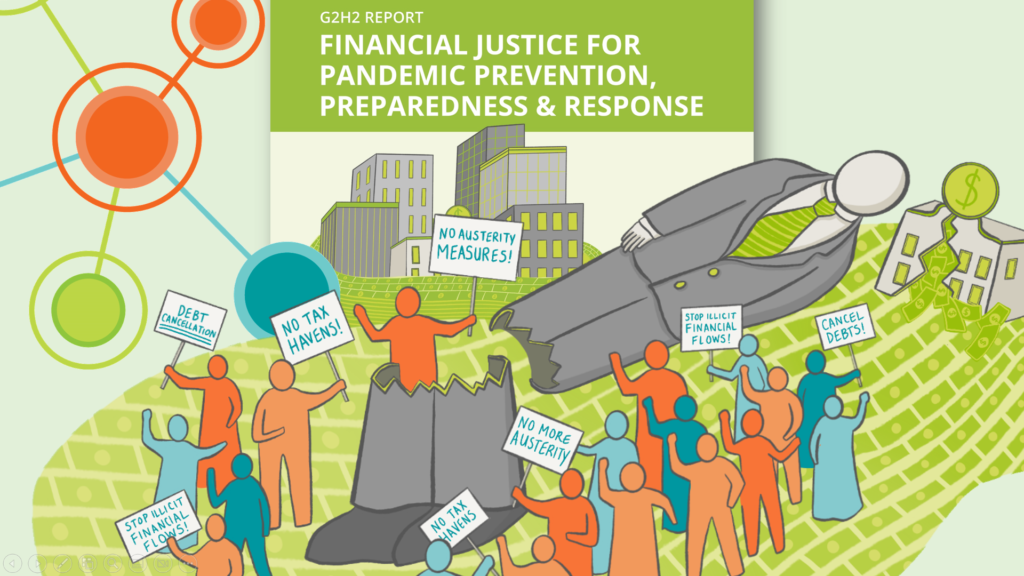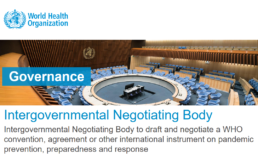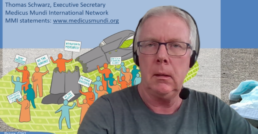Statements by the Executive Secretary of Medicus Mundi International – Network Health for All during the third meeting of the WHO Intergovernmental Negotiating Body (INB), 5-7 December 2022
Input 1: Comments on the promotion and protection of the rights of health and care workers as part of “strengthening and sustaining a skilled and competent health workforce” (Chapter IV, Article 11, of Conceptual Zero Draft)
MMI input to INB 3, delivered on 6 December 2022 (full text as submitted in written form)
At the 75th World Health Assembly, in May 2022, WHO member states approved a “global health and care workers compact” as a “technical document to be considered by member states”. Now, the negotiation of a new international legal instrument by the WHO INB provides an opportunity for defining new international legal norms or strengthening existing ones on how to protect health and care workers in health emergencies and pandemics, in a chronic and global situation of scarcity of skilled people who care for us and risk their health and lives for doing so.
We congratulate the INB Bureau for having provided, with Article 11 of the Conceptual Zero Draft, a good starting point, taking up some of the proposals emerging from an expert roundtable convened by MMI in October.
We expect the INB in the “proper” drafting of the new instrument to sustain and strengthen these provisions, and Member States to comply. This would mainly request to have the provisions of Art. 11 framed as legally binding (“shall”, not “should”), and to have strong compliance and accountability mechanisms for the whole new instrument.
We recommend WHO and member states to deepen the conversation on measures to strengthen the health workforce and on the promotion and protection of the rights of health and care workers as part of the new WHO international legal instrument at the upcoming 5th Global Forum on Human Resources for Health convened by the WHO in April 2023. It would be timely and the outcome could then be fed back by member states and other parties into the drafting process.

Picture: PAHO
Input 2: Comments on sustainable and predictable financing in the Conceptual Zero Draft (Chapter VI, Article 18)
MMI input to INB 3 delivered on 7 December (full text, as submitted in written form)
In a comment related to the second meeting of the Intergovernmental Negotiating Body, in July, we discussed the notion of sovereignty and asked the member states representatives the following: “How do you feel about national sovereignty if you do not have the money and means to properly care for your people in terms of universal access to public health care,
- because of tax avoidance and evasion limiting your fiscal space;
- because of unfair international terms of trade;
- because of debt service and imposed austerity measures;
- because of the unfair competition by private healthcare providers,
…as part of a globalized, commercialized and financialized system?
To re-establish your real sovereignty, and in a sense of true, systemic prevention of future pandemics, you should draft the new instrument in a way that it contributes to achieving financial justice and overcoming the colonial patterns of dependency and charity, by addressing the failures of the current international economic order. Will you dare?”
…well, the Bureau of the INB has not dared yet. Article 18 of the conceptual zero draft is disappointing, as it only contains recommendations that already proved to be ineffective and unsustainable, such as greater collaboration with the private sector to strengthen domestic financing, or an implicit reference to the “Pandemic Fund” set up in a rush and launched in November. Furthermore, it is missing ambitious language on a system for fair share contributions from countries to finance PPPR.
So let us be clear, once more: There is no shortage of money in this world, but redirecting that money in a sense of financial, fiscal and economic justice needs the full attention of the INB and its members. It needs solidarity and bold action, mainly through international regulation on global tax rules, fighting illicit financial flows and cancelling debt, to be expressed in the zero draft of the new WHO instrument.
For a deeper analysis we refer to recent statements, publications and political initiatives related to debt, tax avoidance, financial flows and austerity, and recommend to all INB members to read the G2H2 report “Financial Justice for Pandemic Prevention, Preparedness and Response” published in November in view of INB3.

Picture: G2H2



